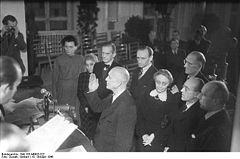
Otto Ostrowski
Encyclopedia
Otto Ostrowski was a German politician of the Social Democratic Party of Germany
(SPD) and Mayor of Berlin in 1946–1947.
Ostrowski graduated in Romance studies
and after World War I
joined the SPD. From 1922 he served as mayor of Finsterwalde
until he was elected mayor of the Berlin
borough of Prenzlauer Berg
in 1926. He held this office up to the Nazi seizure of power in 1933, when he was forced to resign. A fierce opponent of the Nazis, he helped hiding Jewish persecutees to protect them from deportation to the extermination camps. After World War II
he was appointed mayor of Berlin-Wilmersdorf
in 1946.
 In the elections of 20 October 1946 the SPD had reached a 48.7% share of votes and the new city parliament of Berlin (predecessor of the present-day Abgeordnetenhaus
In the elections of 20 October 1946 the SPD had reached a 48.7% share of votes and the new city parliament of Berlin (predecessor of the present-day Abgeordnetenhaus
) elected Ostrowski for mayor on 5 December 1946. He stepped into office on 8 January 1947, but from the beginning had to deal with the uncertain relationship to the deputies of the Socialist Unity Party of Germany
(SED). The party had been formed on 21 April 1946 by the merger of the SPD in the Soviet occupation zone with the Communist Party of Germany
(KPD), strongly backed by the Soviet authorities. Though the SPD in the western sectors - including Ostrowski himself - refused this union, he appointed SED members for the city council against strong resistance in his party and was finally voted out of office on 11 April 1947.
Social Democratic Party of Germany
The Social Democratic Party of Germany is a social-democratic political party in Germany...
(SPD) and Mayor of Berlin in 1946–1947.
Ostrowski graduated in Romance studies
Romance studies
Romance studies is an umbrella academic discipline that covers the study of the languages, literatures, and cultures of areas that speak a Romance language. Romance studies departments usually include the study of Spanish, French, Italian, and Portuguese...
and after World War I
World War I
World War I , which was predominantly called the World War or the Great War from its occurrence until 1939, and the First World War or World War I thereafter, was a major war centred in Europe that began on 28 July 1914 and lasted until 11 November 1918...
joined the SPD. From 1922 he served as mayor of Finsterwalde
Finsterwalde
Finsterwalde is a town in the Elbe-Elster district , in Brandenburg, Germany.-Overview:It is situated on the Schackebach, a tributary of the Kleine Elster, 28 m. W.S.W of Cottbus by rail. Pop. 18,840. The town has a Gothic church , a castle, schools, cloth and cigar factories, iron-foundries,...
until he was elected mayor of the Berlin
Berlin
Berlin is the capital city of Germany and is one of the 16 states of Germany. With a population of 3.45 million people, Berlin is Germany's largest city. It is the second most populous city proper and the seventh most populous urban area in the European Union...
borough of Prenzlauer Berg
Prenzlauer Berg
Prenzlauer Berg is a locality of Berlin, in the borough of Pankow.Until 2001, Prenzlauer Berg was a borough of Berlin; in that year it was included in the borough of Pankow....
in 1926. He held this office up to the Nazi seizure of power in 1933, when he was forced to resign. A fierce opponent of the Nazis, he helped hiding Jewish persecutees to protect them from deportation to the extermination camps. After World War II
World War II
World War II, or the Second World War , was a global conflict lasting from 1939 to 1945, involving most of the world's nations—including all of the great powers—eventually forming two opposing military alliances: the Allies and the Axis...
he was appointed mayor of Berlin-Wilmersdorf
Wilmersdorf
Wilmersdorf is an inner city locality of Berlin, formerly a borough by itself but since Berlin's 2001 administrative reform a part of the new borough of Charlottenburg-Wilmersdorf.-History:...
in 1946.

Abgeordnetenhaus von Berlin
The Abgeordnetenhaus of Berlin is the state parliament for the German state of Berlin, according to the state's constitution. The parliament is based at the building on Niederkirchnerstraße in Mitte which until 1934 was the seat of the lower house of the Preußischer Landtag...
) elected Ostrowski for mayor on 5 December 1946. He stepped into office on 8 January 1947, but from the beginning had to deal with the uncertain relationship to the deputies of the Socialist Unity Party of Germany
Socialist Unity Party of Germany
The Socialist Unity Party of Germany was the governing party of the German Democratic Republic from its formation on 7 October 1949 until the elections of March 1990. The SED was a communist political party with a Marxist-Leninist ideology...
(SED). The party had been formed on 21 April 1946 by the merger of the SPD in the Soviet occupation zone with the Communist Party of Germany
Communist Party of Germany
The Communist Party of Germany was a major political party in Germany between 1918 and 1933, and a minor party in West Germany in the postwar period until it was banned in 1956...
(KPD), strongly backed by the Soviet authorities. Though the SPD in the western sectors - including Ostrowski himself - refused this union, he appointed SED members for the city council against strong resistance in his party and was finally voted out of office on 11 April 1947.

